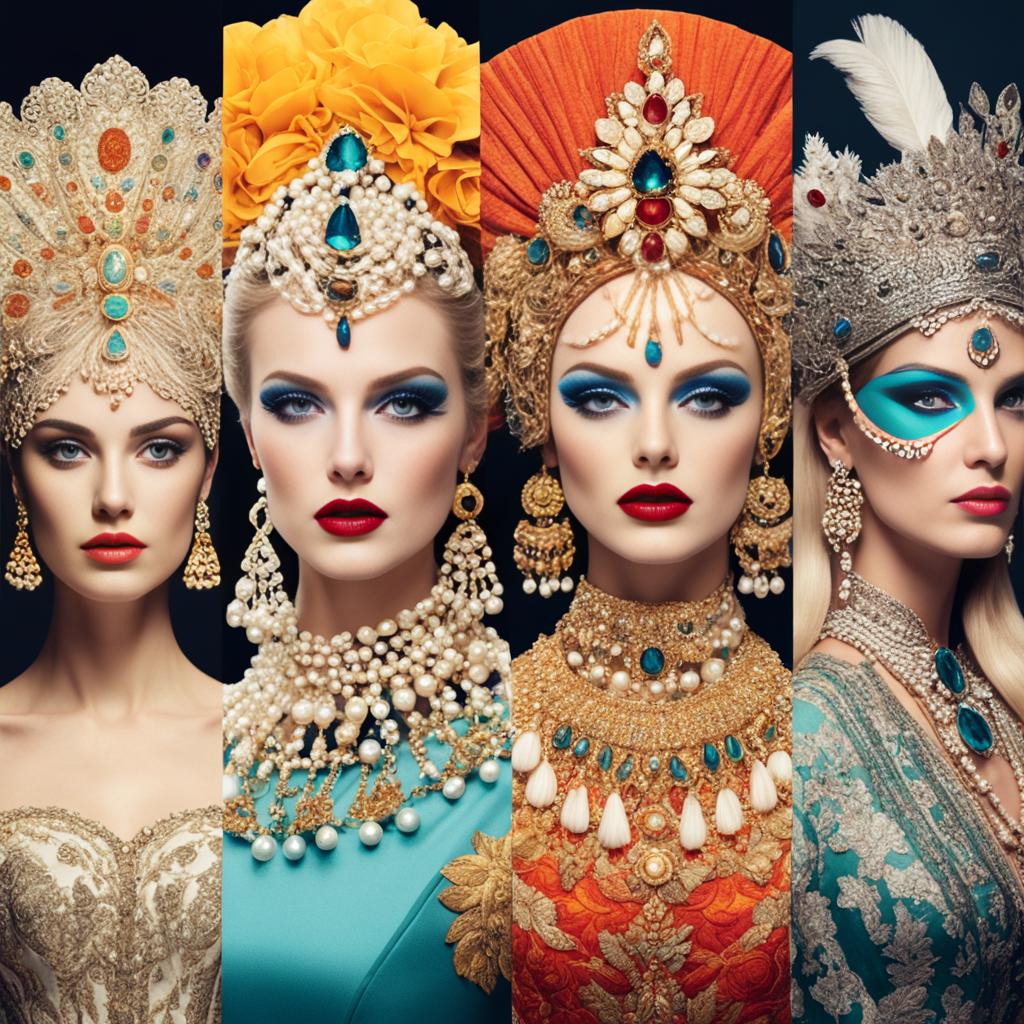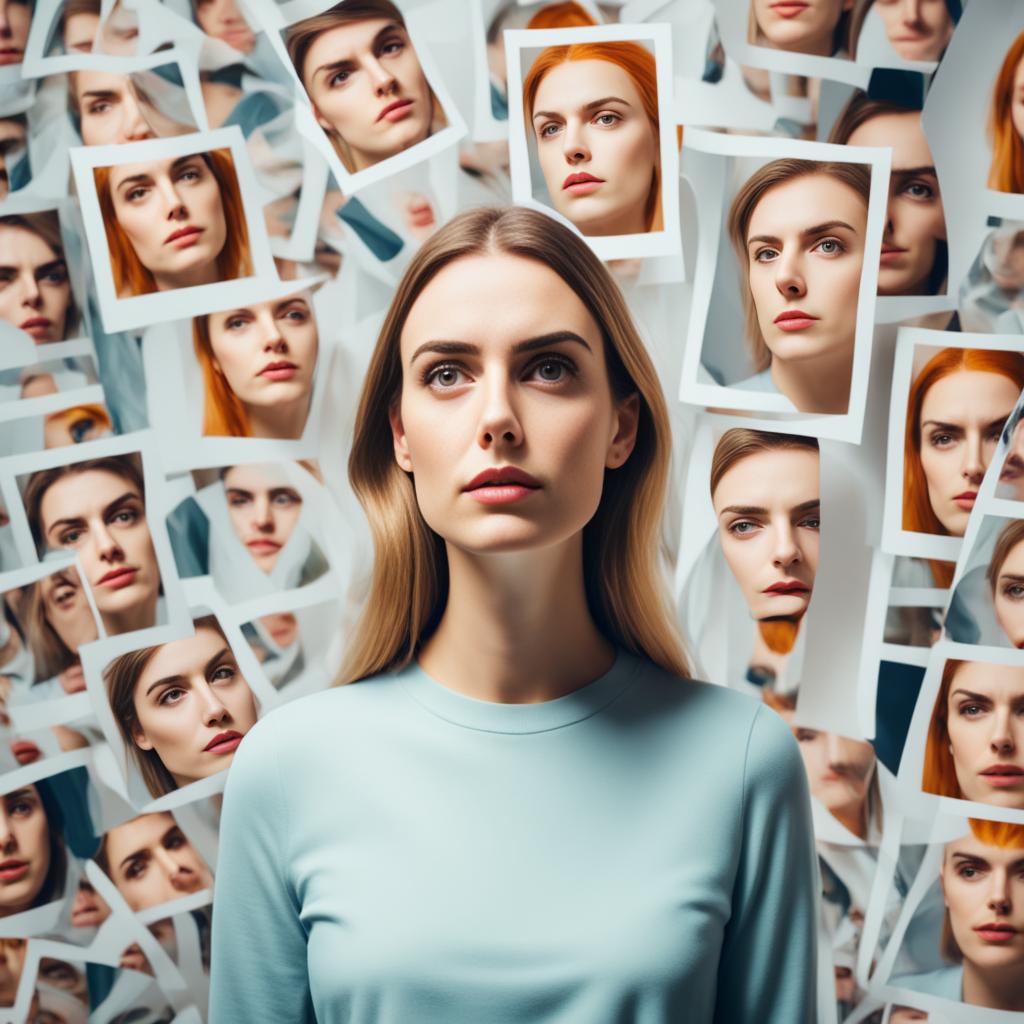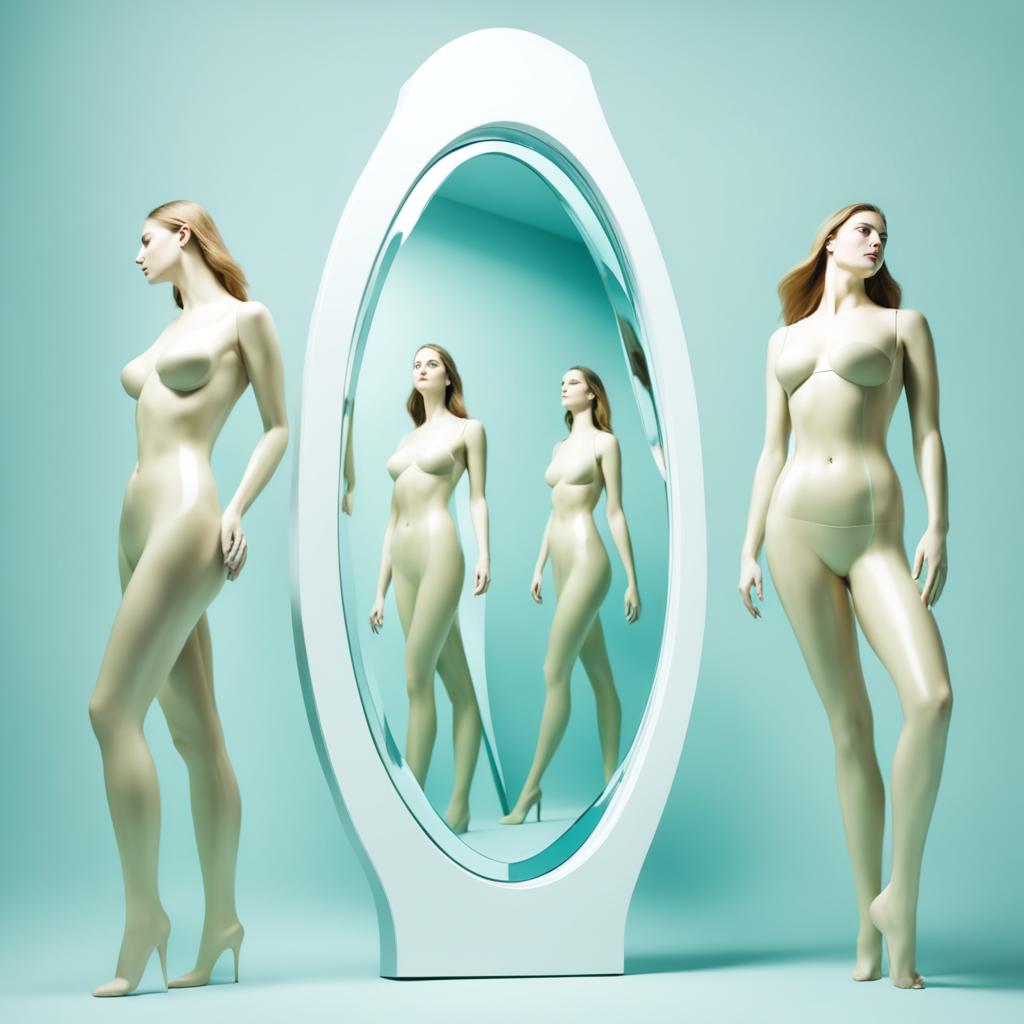Did you know that over 90% of women and over 80% of men are dissatisfied with their bodies?
Body image, the perception one has of their own physical appearance, plays a significant role in our daily lives. It affects our self-esteem, relationships, and overall well-being. From a young age, we’re bombarded with societal beauty standards that shape our perception of what is considered attractive and acceptable.
This section of our article explores the psychological factors that contribute to individuals’ perceptions of their own bodies in relation to societal ideals. By understanding the psychology of body image, we can shed light on the complex interplay between beauty standards and self-perception.
Join us as we delve into the impact of media influence, cultural and societal factors, the connection between body image and self-esteem, the effect on mental health, and more. Together, we can navigate this challenging landscape and develop healthier perceptions of ourselves and ot
The Impact of Media Influence
Movies, television shows, magazines, and social media have a profound impact on our perceptions of body image. The media plays a powerful role in shaping beauty standards and influencing how individuals perceive their own bodies.
The constant exposure to idealized images portrayed in the media can significantly impact self-esteem and self-perception. Media representations often prioritize a narrow definition of beauty, emphasizing thinness, flawless skin, and a particular body shape. These unrealistic and often digitally altered images create an unattainable standard that can leave individuals feeling inadequate and dissatisfied with their own bodies.
Studies have shown that exposure to media images depicting an unrealistic body ideal can contribute to negative body image and low self-esteem, especially among vulnerable populations such as adolescents and young adults. Research also suggests that media influence can lead to the internalization of beauty standards, whereby individuals compare themselves to these images and strive to achieve an unattainable ideal.
“The media has the power to shape societal beauty ideals, influencing how individuals perceive their bodies and themselves. By portraying a limited and unrealistic range of body types, the media creates a harmful standard that can negatively impact self-esteem and body image.”
– Dr. Sarah Thompson, Psychology Today
It is important to recognize the role of media influence and its potential detrimental effects on body image. However, it is equally crucial to promote media literacy and critical thinking skills as a means of understanding and challenging unrealistic beauty standards perpetuated by the media.
By diversifying media representation and showcasing a wider range of body types, ethnicities, and abilities, we can contribute to a more inclusive and positive media culture. Additionally, promoting body positivity and self-acceptance can help individuals develop a healthier relationship with their bodies and resist the negative influences of media.


The Power of Positive Media Representation
While media can negatively impact body image, it also has the potential to foster positive change. When media platforms actively feature diverse body types, challenge conventional beauty standards, and promote self-acceptance, it becomes a powerful tool for shaping healthier perceptions of body image.
By showcasing individuals of different sizes, ethnic backgrounds, gender identities, and abilities, media can help break down harmful stereotypes and cultivate a sense of inclusivity. Recognizing and celebrating diverse beauty can contribute to positive self-perception and body acceptance for individuals of all backgrounds.
It is crucial for media consumers to be critical of the messages they receive and actively seek out inclusive and diverse content. By supporting media that champions body positivity and representation, individuals can play an active role in shaping media culture and promoting healthier body image ideals.
Cultural and Societal Influences
Beauty standards and body image are significantly influenced by cultural and societal factors. Cultural norms, social media, and peer perceptions all play a role in shaping individuals’ self-perception and self-esteem.
Cultural influences have a profound impact on beauty standards and body image. Different cultures often have unique ideals and expectations when it comes to physical appearance. For example, in some cultures, a curvier figure may be considered attractive, while in others, a slender physique may be preferred. These cultural norms can shape individuals’ perception of their own bodies and influence their self-esteem.
Societal influences, particularly through social media, further contribute to the formation of beauty standards. Social media platforms like Instagram and TikTok are filled with images that showcase a specific, often idealized, body type. Constant exposure to these images can lead individuals to compare themselves and strive for an unrealistic beauty ideal, ultimately affecting their body image and self-worth.
“Social media has made it easier than ever to compare ourselves to others, perpetuating unrealistic beauty standards and negatively impacting body image,” says Dr. Maria Rodriguez, a psychologist specializing in body image and self-esteem.
Peer perceptions also play a significant role in shaping body image. Perception of beauty and acceptance within social circles can influence an individual’s self-perception and body image. Unrealistic beauty standards established within peer groups can lead to feelings of inadequacy and a negative body image.
It is important to recognize the influence of cultural and societal factors on body image and develop a critical perspective. By challenging unrealistic beauty ideals and promoting body diversity, we can foster a more inclusive and positive body image for individuals of all backgrounds.


Cultural and societal influences have a significant impact on individuals’ body image and self-perception. By raising awareness and promoting acceptance of diverse body types, we can work towards a more positive and inclusive society.
Body Image and Self-Esteem
Body image and self-esteem are deeply interconnected. The way we perceive our bodies can have a significant impact on our overall sense of self-worth and confidence. When individuals have a negative body image, they often struggle with low self-esteem, which can affect various aspects of their lives.
Body image refers to how we see, feel, and think about our own bodies. It is influenced by a variety of factors, including media portrayals, societal beauty standards, and personal experiences. When individuals compare themselves to unrealistic ideals perpetuated by the media, it can lead to feelings of inadequacy and dissatisfaction with their own bodies.
Self-esteem is the value and worth we place upon ourselves. It is closely tied to body image because our perceptions of our physical appearance can greatly influence how we feel about ourselves as a whole. When individuals have a negative body image, they may develop low self-esteem, believing that their worth as a person is determined by their appearance.
“My body is not perfect, but it allows me to do amazing things. It’s about focusing on what my body can do rather than how it looks.” – Jennifer, fitness enthusiast
Having low self-esteem can manifest in various ways. It may lead to social withdrawal, feelings of shame and self-consciousness, and difficulty asserting oneself in relationships or professional settings. Negative body image can also contribute to the development of mental health issues such as anxiety, depression, and eating disorders.
In order to improve self-esteem and foster a positive body image, it is important to challenge negative thoughts and beliefs about one’s appearance. Recognizing that beauty comes in diverse shapes and sizes is crucial. Surrounding oneself with body-positive influences, including supportive friends, body acceptance movements, and diverse media representation, can also help reshape perceptions of beauty.
Practicing self-care and engaging in activities that promote self-acceptance and self-love are effective strategies for improving body image and self-esteem. This can include engaging in physical activity for enjoyment rather than solely focusing on changing one’s appearance, practicing positive self-talk, and seeking professional support if needed.
Strategies to Improve Body Image and Self-Esteem:
- Focus on celebrating what your body can do rather than how it looks.
- Avoid comparing yourself to unrealistic beauty standards portrayed in the media.
- Surround yourself with body-positive influences and diverse representations of beauty.
- Engage in self-care activities that promote self-acceptance and self-love.
- Practice positive self-talk and challenge negative thoughts about your body.
- Seek professional support if you are struggling with low self-esteem and body image issues.
By taking steps to foster a positive body image and cultivate self-esteem, individuals can experience improved well-being, increased confidence, and greater overall satisfaction with themselves and their lives.


The Effect of Body Image on Mental Health
Body image plays a significant role in an individual’s mental health and overall well-being. The perception of one’s own body can have a profound impact on mental well-being, influencing self-esteem, self-worth, and overall happiness. A distorted body image can lead to a range of negative psychological effects, including the development of eating disorders, such as anorexia nervosa, bulimia nervosa, and binge eating disorder.


Individuals who have a negative body image are at higher risk of experiencing depression, anxiety, and low self-esteem. The constant pressure to attain societal beauty standards can lead to feelings of inadequacy, comparison, and dissatisfaction with one’s own appearance. This negative self-perception can contribute to the development or exacerbation of mental health conditions.
Moreover, body dysmorphia, a psychological disorder characterized by obsessive preoccupation with perceived flaws in one’s appearance, is another common consequence of poor body image. Individuals with body dysmorphia often experience intense distress and impairments in daily functioning due to their distorted perception of their own bodies.
“When I look in the mirror, I don’t see what others see. I constantly find flaws and obsess over them. It’s exhausting and takes a toll on my mental health.” – Jennifer, a body dysmorphia survivor
Addressing the negative impact of body image on mental health requires a comprehensive approach. It involves challenging unrealistic beauty standards, promoting body positivity, and fostering self-acceptance. Recognizing the importance of mental well-being in relation to body image is crucial for individuals to cultivate a positive self-image and enhance their overall quality of life.
Next, we will explore the psychological factors that influence body image perception and the role of gender in shaping self-perception and societal expectations.
Psychological Factors Influencing Body Image
When it comes to body image, there are various psychological factors at play that shape how individuals perceive themselves. These factors have a significant impact on self-esteem and body satisfaction. Let’s explore some of the key psychological factors that influence body image.
Social Comparison
One major psychological factor that affects body image is social comparison. In today’s interconnected world, it is easy to compare ourselves to others, particularly through social media. Constant exposure to carefully curated images of seemingly perfect bodies can lead to feelings of inadequacy and dissatisfaction with our own appearance. It’s important to remember that social media often presents an unrealistic and idealized version of reality.
“Comparison is the thief of joy.” – Theodore Roosevelt
Social Pressures
Social pressures, such as societal beauty standards and expectations, can have a significant impact on body image. Cultural ideals of attractiveness, often perpetuated by the media and advertising industry, can create unrealistic and unattainable beauty standards. Internalizing these societal pressures can lead to body dissatisfaction and a negative body image.
Internalized Ideals
Internalized ideals are another psychological factor influencing body image. Over time, individuals may internalize the beauty standards and expectations imposed upon them by society. This can lead to a distorted perception of their own bodies, as they strive to meet these unrealistic ideals. Breaking free from internalized ideals and embracing body diversity is crucial for developing a positive body image.
Understanding the psychological factors that shape body image is essential for promoting self-acceptance and improving overall well-being. By challenging social comparison, questioning societal beauty standards, and embracing diverse body types, we can foster a more positive body image for ourselves and those around us.


Gender and Body Image
Gender plays a significant role in shaping individuals’ body image and self-perception. Societal expectations and gender roles often impose distinct standards of beauty on men and women, creating unique challenges that individuals face in relation to their body image.
For women, societal pressures often emphasize thinness, youthfulness, and specific physical attributes. Media representations perpetuate these ideals, creating unrealistic expectations that can lead to negative self-perception and body dissatisfaction. Women may feel the need to conform to these societal standards, which can put immense pressure on their mental well-being.
Men, on the other hand, face expectations related to muscularity, strength, and physical dominance. The media often portrays an idealized male physique that can be difficult to attain for the majority of men. This can lead to body dissatisfaction, low self-esteem, and the development of harmful behaviors such as excessive exercise or anabolic steroid use in an attempt to conform to societal ideals.
The Influence of Gender Roles
Gender roles also play a role in shaping body image. Historically, women have been expected to prioritize their appearance, while men have been encouraged to emphasize strength and physical prowess. These gender norms can contribute to body dissatisfaction and the perpetuation of unrealistic beauty standards.
“Societal expectations and gender roles often impose distinct standards of beauty on men and women, creating unique challenges that individuals face in relation to their body image.”
Unique Challenges Faced by Transgender Individuals
Transgender individuals may face even greater challenges in maintaining a positive body image. The process of transitioning and aligning their physical appearance with their gender identity can be emotionally and psychologically taxing. Society’s often limited understanding and acceptance of gender diversity can further exacerbate body image concerns for transgender individuals.
It is essential to recognize and challenge societal expectations and gender norms to foster healthy body image and self-perception for all individuals, regardless of their gender. Embracing diversity, promoting self-acceptance, and encouraging positive representations of different body types are key steps towards creating a more inclusive and body-positive society.
Next, we will explore the concept of body positivity and its potential impact on individuals’ body image.
Body Positivity and Its Impact
The concept of body positivity has gained significant traction in recent years, revolutionizing the way individuals perceive their bodies. In a society that often perpetuates unrealistic beauty standards, body positivity aims to challenge these ideals and promote self-acceptance, regardless of size, shape, or appearance.
Embracing diverse body types is at the core of body positivity. It encourages individuals to celebrate their unique features and recognize that beauty comes in all shapes and sizes. By fostering a culture of acceptance, body positivity empowers individuals to break free from the constraints of societal expectations and find confidence in their own bodies.
One of the key impacts of body positivity is its ability to improve body image. When individuals adopt a body-positive mindset, they begin to recognize the inherent worth and beauty in themselves and others. This shift in perspective can have a profound effect on overall self-esteem and mental well-being.
“Body positivity is about embracing your body as it is and recognizing that your worth extends far beyond your physical appearance.”
Through body-positive campaigns, social media movements, and inclusive representation in the media, the body positivity movement has started to reshape beauty standards. It encourages brands, influencers, and society as a whole to prioritize inclusivity and portray a more accurate reflection of the diverse population.
While body positivity is a powerful movement, it’s important to note that it goes beyond aesthetics. It also emphasizes the importance of self-care and nurturing one’s mental, emotional, and physical well-being. It encourages individuals to focus on self-love, self-acceptance, and holistic health.
Embracing body positivity not only has profound individual impacts but also extends to creating positive social change. By challenging societal beauty standards, we pave the way for greater inclusivity and diversity. This fosters a more accepting and supportive environment for everyone, regardless of their body image.
Championing Body Positivity: Tips for Individuals
- Surround yourself with body-positive influences, such as social media accounts, communities, or individuals who promote self-love and acceptance.
- Celebrate your body’s strengths and focus on its abilities rather than aesthetic aspects.
- Avoid comparing yourself to others and remember that each person’s journey is unique.
- Practice self-care activities that promote well-being, such as exercise, mindfulness, and engaging in hobbies.
- Challenge negative thoughts and replace them with positive affirmations about your body and self-worth.
- Engage in acts of kindness and support others on their own journeys towards body positivity.
By embracing body positivity, individuals can cultivate a healthier relationship with their bodies, fostering self-love, and acceptance. Together, we can create a more inclusive society that celebrates diversity and rejects unrealistic beauty standards.
Body Image and Relationships
Body image can have a significant impact on our relationships, influencing how we perceive ourselves and how we interact with others. When individuals struggle with their body image, it can affect their self-confidence and create barriers in forming and maintaining healthy connections.
One of the key ways that body image can affect relationships is through self-perception. When someone has a negative perception of their own body, they may struggle with feelings of insecurity and low self-esteem. These feelings can spill over into their relationships, causing them to doubt their worthiness of love and acceptance. This can lead to difficulties in trusting others and forming deep connections.
“When I don’t feel good about myself, it’s hard for me to believe that anyone else could truly find me attractive or desirable. I constantly worry that my partner will leave me for someone who fits societal beauty standards better.” – Emma, 28
Body image concerns can also impact the dynamics of romantic relationships. Individuals who are dissatisfied with their bodies may avoid intimate situations or feel anxious about being seen naked or vulnerable. This can create tension and strain in the relationship, affecting both emotional and physical intimacy.
Friendships can also be affected by body image issues. In some cases, individuals may compare themselves to their friends or feel envious of their perceived physical attributes. This can lead to feelings of resentment or insecurity within the friendship, hindering its ability to thrive.
Building Healthy Relationships and Self-Perception
Developing a healthy body image is crucial for nurturing positive relationships. It starts with cultivating self-acceptance and self-love. Learning to appreciate and value oneself beyond physical appearance can improve self-esteem and enhance relationship dynamics.
Communication is essential in addressing body image concerns within relationships. Openly discussing insecurities and fears with a partner or friend can create an atmosphere of understanding and support. Being able to voice concerns and receive reassurance can help alleviate anxieties related to body image and strengthen the bond between individuals.
Practicing self-care and engaging in activities that make you feel good can also contribute to building a positive body image. Engaging in regular exercise, nourishing your body with healthy foods, and prioritizing self-care routines can boost self-esteem and promote a more positive self-perception.
Ultimately, fostering a healthy body image requires embracing diversity in all its forms and challenging societal beauty standards. By appreciating and celebrating the uniqueness of ourselves and others, we can create an environment that promotes acceptance and kindness within our relationships.
Building a Positive Body Image
Developing a positive body image is essential for overall well-being and self-confidence. It involves embracing your body, accepting it as it is, and challenging negative thoughts and societal pressures. Here are some practical tips and strategies to help you build a positive body image:
- Practice self-acceptance: Accepting your body, including its unique features and imperfections, is the first step towards developing a positive body image. Focus on what your body can do rather than how it looks.
- Nurture self-care: Engage in activities that promote self-care, such as regular exercise, adequate sleep, and a balanced diet. Taking care of your physical and mental well-being can enhance your body image.
- Challenge negative thoughts: Be mindful of negative thoughts about your body and challenge them. Replace them with positive affirmations and focus on your strengths and accomplishments.
- Avoid comparison: Comparing yourself to others can fuel negative body image. Remember that everyone is unique, and beauty comes in different forms. Embrace your individuality and celebrate it.
- Surround yourself with positivity: Surround yourself with people who uplift and support you. Engage with body-positive media, influencers, and communities that promote self-love and acceptance.
- Set realistic goals: Set achievable and realistic goals that focus on health and well-being rather than appearance. Prioritize feeling good, both physically and mentally.
“Your body is unique and beautiful in its own way. Embrace it, love it, and let go of society’s narrow beauty standards.”
Building a positive body image takes time and effort. Be patient with yourself and remember that it’s a journey. By adopting these strategies, you can improve your self-perception and cultivate a healthy relationship with your body.
Nurturing Healthy Body Image in Children and Adolescents
Developing a healthy body image is crucial for the overall well-being and self-esteem of children and adolescents. During these formative years, individuals are susceptible to societal pressures and media influences that can negatively impact their perception of themselves. Parents, educators, and media literacy play a vital role in nurturing positive self-perception in young minds.
Parents have the primary responsibility of creating a supportive environment that fosters self-acceptance and body positivity. Encouraging open conversations about body image, emphasizing the importance of inner qualities over physical appearance, and modeling healthy behaviors can have a lasting impact on children’s self-esteem. Additionally, parents can expose their children to diverse body types through books, media, and real-life experiences, teaching them to appreciate and embrace body diversity.
Teaching children to love and accept themselves for who they are is the foundation of a healthy body image. By providing unconditional love and support, parents can empower their children to develop a positive self-perception.
Education plays a crucial role in promoting a healthy body image among children and adolescents. Educators can incorporate body positivity and self-esteem enhancement lessons into the curriculum, teaching students to value themselves beyond physical appearance. By creating a safe and inclusive classroom environment, educators can encourage open discussions about body image, thereby promoting self-acceptance and reducing the influence of unrealistic beauty standards.
Media literacy is essential in the digital age, where children and adolescents are exposed to a constant influx of images and messages that shape their body image. Teaching young individuals to critically analyze media messages, question beauty ideals, and recognize image manipulation empowers them to make informed choices. Media literacy programs, both in schools and at home, can equip children with the skills needed to navigate the media landscape effectively.
Nurturing Healthy Body Image in Children and Adolescents: Key Tips
- Encourage open conversations about body image and self-acceptance.
- Model a positive body image and healthy behaviors.
- Promote body diversity through exposure to diverse media and real-life experiences.
- Incorporate body positivity lessons into the curriculum.
- Create a safe and inclusive environment in classrooms.
- Teach media literacy skills to critically analyze media messages.
Nurturing a healthy body image in children and adolescents requires a collective effort from parents, educators, and society as a whole. By instilling self-acceptance, promoting body diversity, and equipping young individuals with media literacy skills, we can empower them to develop positive self-perception and cultivate a resilient sense of self-esteem.
Conclusion
Throughout this article, we have explored the profound impact of beauty standards and media influence on individuals’ body image and self-esteem. It is evident that societal expectations, perpetuated by the media, can shape our perceptions of what is considered ideal.
However, it is crucial to recognize that true beauty comes in all shapes and sizes. Promoting body positivity and self-acceptance can help combat the negative effects of media influence on body image.
By fostering a culture that celebrates diversity and embracing our unique qualities, we can encourage individuals to develop a positive body image and improve their overall well-being.
